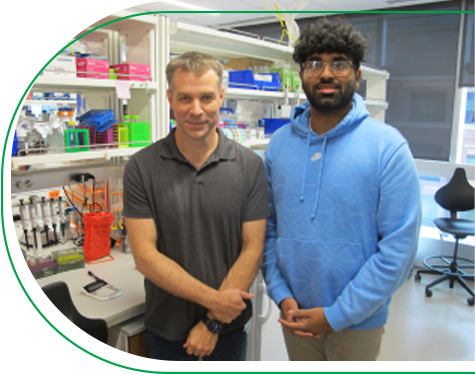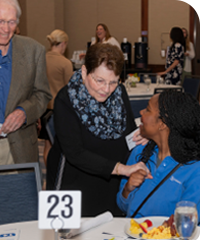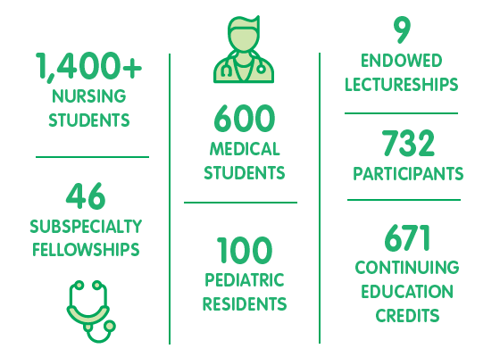Educational Impact
You power a quest for knowledge, growth and discovery

Each year, your investment in medical education and professional development at Children’s Mercy ensures children have access to the best trained experts today and lays the foundation for tomorrow’s generation of healthcare leaders, like Kevin.
Research Mentorship Powers Potential
When Kevin Thomas, a second-year medical student at UMKC, wanted to enhance his hands-on research skills, he found a match with Children’s Mercy Research Institute's John Perry, PhD, Doctoral Research Faculty-Hematology/Oncology/BMT, through the hospital’s Research Learner Portal. Undergraduate, graduate and professional students interested in working with Children’s Mercy researchers can submit their information using the portal to be linked with Children’s Mercy faculty.
“I had done some research on ovarian and pancreatic cancer in high school, really enjoyed it, and knew I wanted to do some sort of oncology-related research,” Kevin said. “But finding research opportunities is hard. Everybody’s busy and has tight schedules.”
Kevin searched online and completed the form he found on Children’s Mercy’s Research Learner Portal.
The hospital reached out to me, said Dr. Perry was available, and asked if I would like to meet with him. I was ecstatic! We started communicating. I was hooked! I was immediately ready to join.
Kevin said working with Dr. Perry’s team has enhanced his understanding of subjects such as flow cytometry (a lab test used to analyze characteristics of cells or particles); T-cells (white blood cells of the immune system); and lentivirus (retroviruses that cause chronic and deadly diseases).
“I’ve been able to expand what I already had learned in the lab, from basic culturing techniques to more advanced things that I had never even heard of before I came here,” Kevin said.
Everyone Wins
Your support of educational programs, like Research Learners, is essential to our work as a leading academic medical center—advancing our mission to improve health care through learning, innovation and research. Each opportunity creates a ripple effect that touches the lives of thousands of patients, providers and students.
“It’s been mutually beneficial,” Dr. Perry said. “We get an extra pair of hands to advance our work for kids, and he gets to have lab experience and mentorship from people in our lab and myself. Helping to train the next generation is super important to me. Hopefully we can prepare a good set of people to do bigger and better things than we’ve done.”
“I feel blessed to have this opportunity to come into the lab and gain valuable experience,” Kevin said.
You continue a legacy of learning
Your commitment to education continues a proud tradition of academic excellence at Children’s Mercy—ensuring thousands of students and learners have access to world-class pediatric training and mentorship each year. Many go on to practice at Children’s Mercy or in our community and region—their collective impact elevating pediatric care and research for children and families in our communities.
2024 Scholarship Awards Celebration brings scholarship recipients, grateful families and donors full circle

In May, nearly 320 scholarship recipients, donors, family and friends gathered to celebrate the awarding of this year’s donor funded nursing, allied health and professional scholarships. Inspired by their experience at Children’s Mercy, scholarship donors fund training opportunities that make our providers the very best for kids—bringing care and healing full circle.

Powerhouses of potential
Thank you for making Children’s Mercy a center of excellence for children and the place families—and aspiring health care providers and leaders—turn to first for pediatric expertise. At Children’s Mercy families find the advantages of a teaching hospital including:
-
The expertise of highly-trained physicians and surgeons, available 24-hours a day.
-
Improved quality of care.
-
New treatments and cures.
-
State-of-the-art technologies.
-
Better outcomes and survival rates.
-
Specialized surgeries and innovative medical procedures.

*Statistics as of fiscal year 2024.
